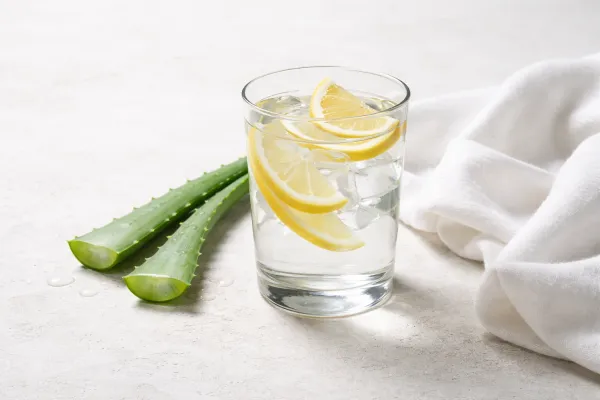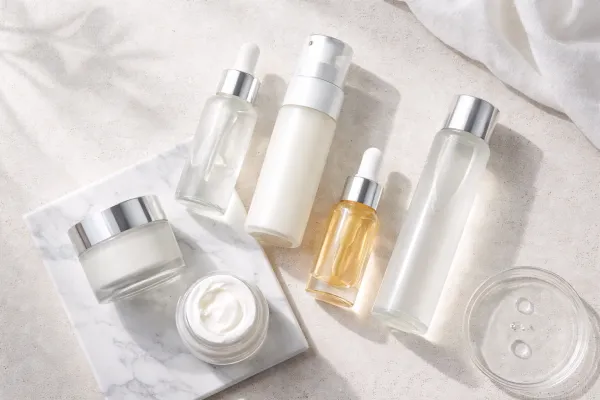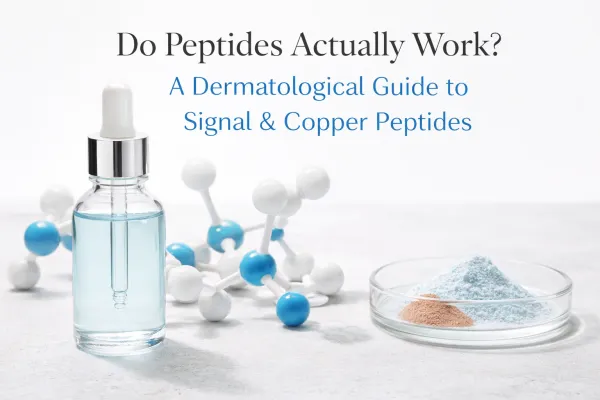Hydration and Skin Barrier Function: The Secret to Healthy Skin
Discover the vital link between hydration and skin barrier function. Learn how to keep your skin healthy, hydrated, and resilient with expert tips.

Ever wonder why some people have that radiant, healthy glow while others struggle with dryness and irritation?
The secret often lies in something called the skin barrier and how well it's hydrated. Think of your skin like a brick wall. If the wall is strong and well-maintained, it keeps the good stuff in and the bad stuff out. But if it's cracked and weak, things start to fall apart.
That's exactly what happens with your skin. Hydration and skin barrier function are crucial for keeping your skin healthy, happy, and looking its best.
I've seen firsthand how neglecting this can lead to all sorts of problems, from simple dryness to more serious conditions like eczema. Trust me, understanding this is a game-changer for your skincare routine.
Key Takeaways: Hydration and Skin Barrier Function
- The skin barrier is your body's first line of defense against the outside world, protecting you from irritants, allergens, and infections.
- Hydration is key to maintaining a strong skin barrier. Without enough water, the skin becomes dry, flaky, and more prone to damage.
- The skin barrier is made up of several layers, including a physical barrier (like a brick wall), a chemical barrier (with an acidic pH), a microbiologic barrier (good bacteria), and an immunologic barrier (your skin's immune system).
- Moisturizers play a vital role in supporting the skin barrier by preventing water loss, attracting moisture, and replenishing essential lipids.
- Factors like environment, lifestyle, diet, and stress can all impact your skin's hydration and barrier function.
- Simple steps like using sunscreen, moisturizing daily, eating a healthy diet, and managing stress can make a big difference in your skin's health.
- Hydration and skin barrier function are not just about looking good; they're essential for overall skin health and preventing skin conditions.
Understanding the Skin Barrier
Let's break down what the skin barrier actually is. Imagine your skin as a fortress. The outermost layer, called the stratum corneum, is like the fortress wall. It's made up of tough skin cells called corneocytes (the "bricks") held together by a mixture of lipids (the "mortar").
This "brick and mortar" structure is what we call the physical barrier. It's designed to keep moisture in and harmful substances out. When I first started learning about skincare, this analogy really helped me visualize how important this barrier is. It's not just some abstract concept; it's a real, physical structure that needs to be taken care of.
Ceramides, cholesterol, and fatty acids are the main components of the "mortar" that holds the skin barrier together. These lipids create a waterproof seal that prevents excessive water loss, also known as trans-epidermal water loss (TEWL). Without them, your skin would be like a leaky faucet, constantly losing moisture to the environment.
- Corneocytes: Tough skin cells that form the "bricks" of the skin barrier.
- Lipids: Fats like ceramides, cholesterol, and fatty acids that act as the "mortar," holding the corneocytes together and preventing water loss.
- Stratum Corneum: The outermost layer of the skin, where the skin barrier resides.
- Trans-epidermal Water Loss (TEWL): The process of water evaporating from the skin. A healthy skin barrier minimizes TEWL.
The Role of Hydration in Skin Barrier Function
Now, let's talk about hydration. Water is life, and that's as true for your skin as it is for the rest of your body.
Hydration and skin barrier function go hand in hand. When your skin is well-hydrated, the skin barrier functions optimally. The "bricks and mortar" stay strong, and the skin remains supple and resilient. But when hydration levels drop, things start to go wrong.

The skin barrier weakens, leading to dryness, flakiness, and increased sensitivity. I remember a time when I was traveling a lot and not drinking enough water. My skin became so dry and irritated that it was painful to even smile. That's when I realized just how crucial hydration is for maintaining a healthy skin barrier.
Think of it this way: a dry sponge is brittle and easily breaks apart. But a well-hydrated sponge is soft and flexible. Your skin is the same way. Proper hydration allows the skin barrier to function effectively, protecting you from the elements and keeping your skin looking and feeling its best.
- Drink plenty of water throughout the day.
- Use a humidifier, especially in dry climates or during winter.
- Choose skincare products that contain hydrating ingredients like hyaluronic acid.
- Avoid long, hot showers, which can strip the skin of its natural oils.
The Chemical Barrier: pH and Its Importance
Beyond the physical structure, your skin also has a chemical barrier. This is all about the pH level of your skin's surface. You might remember pH from science class – it's a measure of how acidic or alkaline something is. Healthy skin has a slightly acidic pH, around 5.
This acidity is crucial for several reasons. First, it helps maintain the integrity of the lipid "mortar" in the skin barrier. Second, it creates an environment that's friendly to beneficial microorganisms (more on that in a minute) and hostile to harmful pathogens.
When the skin's pH is disrupted, it can compromise the skin barrier and lead to problems like irritation, inflammation, and even infections. I once had a client who was using a harsh cleanser that was throwing off her skin's pH. Once we switched her to a pH-balanced cleanser, her skin improved dramatically.
| pH Level | Effect on Skin Barrier |
|---|---|
| Too Alkaline (High pH) | Disrupts lipid barrier, increases TEWL, promotes harmful bacteria growth |
| Slightly Acidic (pH ~5) | Supports lipid synthesis, maintains barrier integrity, promotes beneficial bacteria growth |
| Too Acidic (Low pH) | Can cause irritation and inflammation |
The Microbiologic Barrier: Good Bacteria at Work
Believe it or not, your skin is home to trillions of microorganisms, mostly bacteria. This is called the skin microbiome, and it plays a vital role in skin health. These "good" bacteria help protect against harmful pathogens, regulate inflammation, and even contribute to the skin's hydration levels. A balanced microbiome is essential for a strong skin barrier.

When the balance is disrupted, it can lead to skin problems like acne, eczema, and psoriasis. Using harsh products or over-washing can disrupt the microbiome, so it's important to be gentle with your skin.
I always tell my clients to think of their skin microbiome as a delicate garden that needs to be nurtured, not scorched.
- Microbiome: The community of microorganisms living on the skin.
- Commensal Bacteria: Beneficial bacteria that help protect the skin.
- Pathogens: Harmful microorganisms that can cause infections.
- Dysbiosis: An imbalance in the microbiome that can lead to skin problems.
The Immunologic Barrier: Your Skin's Defense System
Your skin isn't just a passive barrier; it's also an active participant in your immune system. The immunologic barrier is made up of specialized cells and molecules that detect and respond to potential threats, like allergens and pathogens. When the skin barrier is compromised, it's easier for these harmful substances to penetrate the skin and trigger an immune response.
This can lead to inflammation, redness, itching, and other symptoms of skin irritation or allergic reactions. Maintaining a healthy skin barrier helps prevent these unwanted immune responses. It's like having a strong security system that keeps intruders out, so your body's defenses don't have to go into overdrive.
One important aspect of the immunologic barrier is its ability to prevent sensitization to allergens. Sensitization occurs when the immune system becomes overly reactive to a particular substance, leading to an allergic response upon subsequent exposures.
A strong skin barrier helps prevent allergens from penetrating the skin and triggering this sensitization process. This is particularly important for people with conditions like atopic dermatitis, where the skin barrier is often compromised.
| Component | Function |
|---|---|
| Langerhans Cells | Detect and process antigens (foreign substances) in the epidermis |
| Keratinocytes | Produce antimicrobial peptides and cytokines to fight infection and regulate inflammation |
| T Cells | Mediate immune responses in the skin, including inflammation and allergic reactions |
| Mast Cells | Release histamine and other mediators involved in allergic reactions and inflammation |
Moisturizers: Supporting Hydration and Skin Barrier Function
Now that we've covered the different aspects of the skin barrier, let's talk about how to support it. Moisturizers are a key player here. They work in several ways to enhance hydration and strengthen the skin barrier. Occlusives, like petrolatum and mineral oil, create a physical barrier on the skin's surface, reducing TEWL.
Humectants, like glycerin and hyaluronic acid, attract water from the deeper layers of the skin and the environment, increasing hydration in the stratum corneum. Emollients, like ceramides and fatty acids, fill in the gaps between corneocytes, smoothing the skin's surface and helping to restore the lipid barrier.
Using a moisturizer regularly, especially after bathing or showering, can make a huge difference in your skin's health. I always recommend applying moisturizer while the skin is still damp to lock in that extra moisture.
Choosing the right moisturizer depends on your skin type and needs. If you have dry skin, you might want a richer cream with occlusive ingredients. If you have oily skin, a lighter lotion or gel with humectants might be a better choice. And if you have sensitive skin, look for a fragrance-free, hypoallergenic formula.
Finding the best moisturizers for skin barrier repair can be a game-changer for those with compromised skin.
Here are some common moisturizing ingredients and their functions:
- Occlusives: Petrolatum, mineral oil, dimethicone
- Humectants: Glycerin, hyaluronic acid, urea, lactic acid
- Emollients: Ceramides, fatty acids, cholesterol
Factors Affecting Skin Hydration and Barrier Function
Several factors can impact your skin's hydration and barrier function. Some of these are environmental, like dry air, extreme temperatures, and UV radiation. Others are related to lifestyle, like smoking, poor diet, and stress.
Even your skincare routine can play a role – using harsh products or over-washing can strip the skin of its natural oils and disrupt the skin barrier. Being aware of these factors can help you make choices that support your skin's health.
For example, using a humidifier in dry climates, wearing sunscreen daily, and choosing gentle skincare products can all make a positive difference. I once had a client who was a smoker and had very dry, irritated skin. Once she quit smoking and started taking better care of her skin, her complexion improved dramatically.
Here's a breakdown of some key factors and their effects:
- Environmental Factors:
- Dry air: Increases TEWL, leading to dryness and irritation.
- Extreme temperatures: Both hot and cold can disrupt the skin barrier.
- UV radiation: Damages skin cells and impairs barrier function.
- Lifestyle Factors:
- Smoking: Impairs blood flow to the skin, reducing oxygen and nutrient supply.
- Poor diet: Lack of essential nutrients can compromise skin health.
- Stress: Triggers hormonal changes that can negatively impact the skin barrier.
- Skincare Routine:
- Harsh products: Can strip the skin of its natural oils and disrupt the pH balance.
- Over-washing: Can damage the skin barrier and lead to dryness.
- Exfoliating too often: Can irritate the skin and impair barrier function.
Tips for Maintaining Hydration and a Strong Skin Barrier
So, what can you do to keep your skin hydrated and your skin barrier strong? Here are some practical tips:
First, drink plenty of water. It sounds simple, but it's essential for overall health, including skin health.
Second, use a moisturizer daily, especially after bathing or showering.
Third, choose gentle skincare products that won't strip your skin or disrupt its pH balance.
Fourth, protect your skin from the sun by wearing sunscreen and avoiding prolonged exposure during peak hours.
Fifth, eat a healthy diet rich in fruits, vegetables, and healthy fats.
Sixth, manage stress through techniques like exercise, meditation, or spending time in nature.
And finally, be consistent with your skincare routine. It takes time to see results, so don't get discouraged if you don't notice a difference overnight.
👉Remember, healthy skin is a marathon, not a sprint.
Here are some additional tips to consider:
- Use a humidifier in dry environments.
- Avoid long, hot showers or baths.
- Pat your skin dry instead of rubbing it.
- Choose fragrance-free, hypoallergenic products if you have sensitive skin.
- Consider incorporating a serum with antioxidants or other beneficial ingredients into your routine.
- Get enough sleep, as sleep deprivation can negatively impact skin health.
- Learn how to avoid damaging the skin barrier through simple daily habits.
Hydration and Skin Barrier Function in Skin Conditions
Understanding hydration and skin barrier function is particularly important for people with certain skin conditions. In conditions like atopic dermatitis (eczema), the skin barrier is often compromised, leading to increased TEWL, dryness, and inflammation.
Moisturizing is a key part of managing these conditions, as it helps to restore the skin barrier and reduce symptoms. In fact, studies have shown that regular use of moisturizers can significantly improve skin hydration and reduce the severity of eczema. Similarly, in conditions like psoriasis and rosacea, maintaining a healthy skin barrier can help to manage symptoms and prevent flare-ups.
If you have a skin condition, it's important to work with a dermatologist to develop a skincare routine that supports your skin's specific needs. They might recommend specific ingredients or products that can help to repair and strengthen your skin barrier.
Here are some additional considerations for specific skin conditions:
- Atopic Dermatitis (Eczema): Look for moisturizers with ceramides, as these can help to replenish the skin's natural lipid barrier. Avoid fragrances and other potential irritants.
- Psoriasis: Moisturizers with ingredients like salicylic acid or urea can help to soften and remove scales. Occlusive ingredients can also help to reduce TEWL.
- Rosacea: Choose gentle, non-irritating moisturizers. Avoid products with alcohol, menthol, or other potentially irritating ingredients.
- Acne: While acne is not directly caused by a compromised skin barrier, maintaining barrier health can help prevent irritation and inflammation. Look for non-comedogenic moisturizers that won't clog pores. Choosing the right moisturizer is crucial for acne-prone skin, especially for teenagers.
Conclusion
Hydration and skin barrier function are fundamental to healthy skin. By understanding how the skin barrier works and what factors can impact it, you can make informed choices about your skincare routine and lifestyle.
Remember, your skin is your body's first line of defense against the outside world, so it deserves to be treated with care and respect.
By prioritizing hydration, using the right skincare products, and making healthy lifestyle choices, you can support your skin barrier and enjoy a healthy, radiant complexion for years to come.
It's not just about looking good; it's about feeling good in your skin and protecting your overall health. And trust me, your skin will thank you for it!

Frequently Asked Questions: Hydration and Skin Barrier Function - The Secret to Healthy Skin
What is the Skin Barrier, and Why is it So Damn Important?
Your skin barrier, also known as the stratum corneum, is the outermost layer of your skin. It's the gatekeeper, the bouncer, the first line of defense against the outside world. It's made up of corneocytes (dead skin cells) held together by a lipid matrix of ceramides, cholesterol, and fatty acids.
This barrier keeps the good stuff in, like moisture, and the bad stuff out, like irritants, allergens, and pathogens. When it's healthy, your skin is hydrated, resilient, and glowing. When it's compromised, you're looking at dryness, irritation, and a host of other issues.
How Does Hydration Affect Skin Barrier Function?
Hydration is the lifeblood of your skin barrier. Without enough water, the barrier becomes weak and compromised, like a brick wall with crumbling mortar. Proper hydration keeps the corneocytes plump and the lipid matrix intact, allowing the barrier to function optimally.
Dehydration leads to increased transepidermal water loss (TEWL), dryness, flakiness, and increased vulnerability to irritants. The National Eczema Association highlights the link between dehydration and eczema, a condition characterized by a compromised skin barrier.
What's the Difference Between Hydration and Moisturization, and Why Do I Need Both?
Hydration is about increasing the water content of your skin. Moisturization is about preventing that water from escaping. Think of it this way: hydration fills up the water balloon, and moisturization seals it to keep the water in. Humectants like hyaluronic acid and glycerin attract and bind water to the skin, providing hydration.
Emollients like fatty acids and ceramides smooth the skin's surface and fill in the gaps between skin cells. Occlusives like petrolatum and dimethicone create a physical barrier on the skin's surface, preventing TEWL. You need all three for optimal skin barrier function.
What Role Do Ceramides Play in Skin Barrier Function and Hydration?
Ceramides are the superheroes of the lipid matrix, making up about 50% of its composition. They're essential for maintaining the barrier's structure, preventing water loss, and keeping the skin supple and resilient.
Using products with ceramides is like giving your skin barrier a super-powered repair kit. The National Institutes of Health (NIH) has funded research on the role of ceramides in skin health.
How Can I Tell if My Skin Barrier is Damaged?
Signs of a damaged skin barrier include:
- Dryness, flakiness, or peeling
- Redness, irritation, or inflammation
- Increased sensitivity to skincare products
- Itchiness or tightness
- Rough or uneven skin texture
- Increased breakouts or acne
If you're experiencing any of these symptoms, your skin barrier is likely crying out for help.
What are pH Levels, and How Do They Relate to Skin Barrier Function?
pH is a measure of how acidic or alkaline a substance is. Your skin's natural pH is slightly acidic, around 4.7-5.75. This acidity, known as the acid mantle, is crucial for maintaining skin barrier function, supporting enzyme activity, and inhibiting the growth of harmful bacteria.
Using products with a pH that's too high (alkaline) or too low (acidic) can disrupt the acid mantle and compromise the skin barrier. The Food and Drug Administration (FDA) regulates the pH of cosmetics.
What are Humectants, Emollients, and Occlusives, and How Do They Work?
These are the three musketeers of moisturization:
- Humectants (e.g., hyaluronic acid, glycerin) attract and bind water to the skin, increasing hydration.
- Emollients (e.g., ceramides, fatty acids, squalane) smooth and soften the skin by filling in the gaps between skin cells.
- Occlusives (e.g., petrolatum, dimethicone, beeswax) form a physical barrier on the skin's surface, preventing TEWL.
The International Journal of Cosmetic Science has published numerous articles on the functions of these moisturizing ingredients.
How Can I Incorporate Hydration and Barrier Repair into My Skincare Routine?
Here's a simple routine:
- Cleanse: Use a gentle, pH-balanced, sulfate-free cleanser.
- Hydrate: Apply a hyaluronic acid serum to damp skin.
- Moisturize: Use a moisturizer with ceramides, fatty acids, and cholesterol.
- Protect: Apply a broad-spectrum sunscreen with at least SPF 30 daily.
- Treat (Optional): incorporate niacinamide serum for added benefits.
The American Academy of Dermatology (AAD) provides guidelines on creating a basic skincare routine.
What Lifestyle Factors Affect Skin Barrier Function and Hydration?
Your lifestyle choices can make or break your skin barrier.
- Diet: Eat a balanced diet rich in antioxidants, vitamins, and omega-3 fatty acids. The American Society for Nutrition provides resources on nutrition and skin health.
- Hydration: Drink at least 8 glasses of water a day.
- Sleep: Get 7-9 hours of quality sleep per night. The National Sleep Foundation emphasizes the importance of sleep for skin health.
- Stress Management: Practice stress-reducing techniques like meditation or yoga.
- Sun Protection: Wear sunscreen daily and avoid excessive sun exposure. The Skin Cancer Foundation offers comprehensive information on sun protection.
- Smoking: Avoid smoking, as it damages the skin barrier and accelerates aging. The Centers for Disease Control and Prevention (CDC) provides resources on smoking cessation.
- Alcohol Consumption: Limit alcohol intake, as it can dehydrate the skin.
Can Over-Exfoliating Damage My Skin Barrier?
Absolutely! Over-exfoliating, whether with physical scrubs or chemical exfoliants, can strip away the skin barrier, leading to dryness, irritation, and increased sensitivity.
It's like taking a sandblaster to your skin's protective wall. Exfoliate gently and in moderation, no more than 1-2 times per week. The American Academy of Dermatology (AAD) recommends gentle exfoliation for most skin types.





